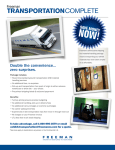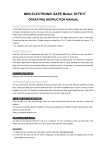Download Hours of Service Manual - Module 3
Transcript
Commercial Vehicle Drivers Hours of Service Module 3 Responsibilities © Microsoft®. June 23, 2008 Commercial Vehicle Drivers Hours of Service © Microsoft®. Things to think about … The purpose of the Federal Commercial Vehicle Drivers Hours of Service Regulations is to reduce fatigue-related commercial vehicle collisions by giving drivers the opportunity to obtain sufficient sleep, but whose responsibility is it to ensure that drivers are not fatigued? Is it the motor carrier’s, shipper’s, consignee’s, third party’s or driver’s responsibility? The answer is “all of them” – safety is everyone’s responsibility. What will I learn in this module? ; Motor carrier responsibilities ; Shipper responsibilities ; Consignee responsibilities ; Third party responsibilities ; Driver responsibilities Module 3: Responsibilities 2 Commercial Vehicle Drivers Hours of Service What are the motor carrier’s responsibilities? Legislative References: - Federal Commercial Vehicle Drivers Hours of Service Regulations (SOR/2005-313) Section 1 Interpretation - Federal Commercial Vehicle Drivers Hours of Service Regulations (SOR/2005-313) Section 4 Responsibilities of Motor Carriers, Shippers, Consignees and Drivers A motor carrier is an individual or a company (and its management) involved with the transportation of goods/passengers by truck or bus. Although drivers usually work for motor carriers, self-employed drivers also transport goods or passengers. Regardless of the driver’s employment situation, the motor carrier has a responsibility to ensure that the driver is following the Federal Commercial Vehicle Drivers Hours of Service Regulations. © Microsoft®. If a motor carrier notices that a driver’s abilities are impaired (by alcohol, drugs, fatigue, health or unknown causes – the cause is unimportant) to the point where it is unsafe for the driver to drive, the motor carrier must refuse to let the driver drive. A motor carrier must not allow any driving that would risk the safety or health of the public, driver or employees of the motor carrier. This includes refusing to let a driver drive if the driver is subject to an out-of-service declaration. We will discuss out-of-service declarations in detail in Module 20. Rather than promoting “just in time” driving at any cost, the motor carrier needs to encourage “due diligence.” The motor carrier must ask: What would a reasonable person do in the same situation to avoid harm to other persons or their property? If a reasonable person would not let the driver drive, the motor carrier must not request, require or allow the driver to drive. Module 3: Responsibilities 3 Commercial Vehicle Drivers Hours of Service What are the shipper’s responsibilities? Legislative References: - Alberta Bill of Lading and Conditions of Carriage Regulation (A/R 313/2002) Section 1 Definitions - Federal Commercial Vehicle Drivers Hours of Service Regulations (SOR/2005-313) Section 4 Responsibilities of Motor Carriers, Shippers, Consignees and Drivers Shipping is the complete process of transporting goods from one location to another. A shipper (also referred to as a consignor) is the person/company who initiates and administers the transport of goods on a commercial vehicle. Because the shipper is usually the last person a driver interacts with before driving, the shipper has a responsibility to ensure that the driver is following the Federal Commercial Vehicle Drivers Hours of Service Regulations. © Microsoft®. If a shipper notices that a driver’s abilities are impaired (by alcohol, drugs, fatigue, health or unknown causes – the cause is unimportant) to the point where it is unsafe for the driver to drive, the shipper must refuse to let the driver drive. A shipper must not allow any driving that would risk the safety or health of the public, driver or employees of the motor carrier. This includes refusing to let a driver drive if the driver is subject to an out-of-service declaration. Rather than promoting “just in time” driving at any cost, the shipper needs to encourage “due diligence.” The shipper must ask: What would a reasonable person do in the same situation to avoid harm to other persons or their property? If a reasonable person would not let the driver drive, the shipper must not request, require or allow the driver to drive. Module 3: Responsibilities 4 Commercial Vehicle Drivers Hours of Service What are the consignee’s responsibilities? Legislative References: - Alberta Bill of Lading and Conditions of Carriage Regulation (A/R 313/2002) Section 1 Definitions - Federal Commercial Vehicle Drivers Hours of Service Regulations (SOR/2005-313) Section 4 Responsibilities of Motor Carriers, Shippers, Consignees and Drivers A consignee is the person who receives the goods transported by the commercial vehicle. Because the consignee (receiver) interacts with a driver, the consignee has a responsibility to ensure that the driver is following the Federal Commercial Vehicle Drivers Hours of Service Regulations. © Microsoft®. If a consignee notices that a driver’s abilities are impaired (by alcohol, drugs, fatigue, health or unknown causes – the cause is unimportant) to the point where it is unsafe for the driver to drive, the consignee must refuse to let the driver drive. A consignee must not allow any driving that would risk the safety or health of the public, driver or employees of the motor carrier. This includes refusing to let a driver drive if the driver is subject to an out-of-service declaration. The consignee must not knowingly allow a motor carrier or driver to break the law. The consignee needs to encourage “due diligence.” The consignee must ask: What would a reasonable person do in the same situation to avoid harm to other persons or their property? If a reasonable person would not let the driver drive, the consignee must not request, require or allow the driver to drive. Module 3: Responsibilities 5 Commercial Vehicle Drivers Hours of Service What are the third party’s responsibilities? - Legislative References: Federal Commercial Vehicle Drivers Hours of Service Regulations (SOR/2005-313) Section 4 Responsibilities of Motor Carriers, Shippers, Consignees and Drivers A third party is anyone who is involved in the commercial transportation industry, directly or indirectly. All third parties have a responsibility to ensure that the driver is following the Federal Commercial Vehicle Drivers Hours of Service Regulations. © Microsoft®. In the bus industry, third parties are often involved in the transportation of passengers. A third party includes a user of the service, tour director, group leader, etc. In the trucking industry, third parties include driver pool and vehicle leasing companies. Other examples of third parties include dispatchers and consultants who offer advice or training to motor carriers. If a third party notices that a driver’s abilities are impaired (by alcohol, drugs, fatigue, health or unknown causes – the cause is unimportant) to the point where it is unsafe for the driver to drive, the third party must refuse to let the driver drive. A third party must not allow any driving that would risk the safety or health of the public, driver or employees of the motor carrier. This includes refusing to let a driver drive if the driver is subject to an out-of-service declaration. The third party must not knowingly allow a motor carrier or driver to break the law. The third party needs to encourage “due diligence.” The third party must ask: What would a reasonable person do in the same situation to avoid harm to other persons or their property? If a reasonable person would not let the driver drive, the third party must not request, require or allow the driver to drive. Module 3: Responsibilities 6 Commercial Vehicle Drivers Hours of Service What are the driver’s responsibilities? Legislative References: - Federal Commercial Vehicle Drivers Hours of Service Regulations (SOR/2005-313) Section 1 Interpretation - Federal Commercial Vehicle Drivers Hours of Service Regulations (SOR/2005-313) Section 4 Responsibilities of Motor Carriers, Shippers, Consignees and Drivers A “driver” is the person who operates the commercial vehicle. Drivers may work for a trucking or bussing company or may be self-employed. All drivers are responsible for ensuring that they follow the Federal Commercial Vehicle Drivers Hours of Service Regulations. If a driver is aware that his/her abilities are impaired (by alcohol, drugs, fatigue, health or unknown causes – the cause is unimportant) to the point where it is unsafe to drive, the driver must refuse to drive. A driver must not drive if it risks the safety or health of the public, driver or employees of the motor carrier. This includes refusing to drive if subject to an out-of-service declaration. A driver who decides not to drive, due to fatigue, is protected under the Federal Regulations. © Microsoft®. The driver needs to use “due diligence.” The driver must ask: What would a reasonable person do in the same situation to avoid harm to other persons or their property? If a reasonable person would not drive, the driver must not drive. Module 3: Responsibilities 7 Commercial Vehicle Drivers Hours of Service Summary The Federal Commercial Vehicle Drivers Hours of Service Regulations will reduce fatigue-related commercial vehicle collisions if motor carriers, shippers, consignees, third parties and drivers work together to ensure that drivers do not drive when it is dangerous for them to do so. Everyone has a responsibility for and can contribute to highway and public safety. Motor Carrier ¬ Shipper ¬ Consignee (Receiver) ¬ Third Party ¬ Driver = Highway and Public Safety Module 3: Responsibilities 8 Commercial Vehicle Drivers Hours of Service Module Self-Check Questions If you can answer the following questions, you are ready to move to the next module. If you can’t answer the questions, please review the module again before continuing. 1) List some of the people who are responsible for deciding whether it is safe for a driver to drive. 2) List the situations in which a driver can be refused the opportunity to drive. 3) Explain “due diligence.” 4) Can a driver refuse to drive because he/she is fatigued? Module 3: Responsibilities 9 Commercial Vehicle Drivers Hours of Service Answers to Module Self-Check Questions 1) List some of the people who are responsible for deciding whether it is safe for a driver to drive. • Motor Carrier • Shipper • Consignee (Receiver) • Third party (user of the service, tour director, group leader, etc.) • Driver 2) List the situations in which a driver can be refused the opportunity to drive. • Driver’s abilities are impaired (by alcohol, drugs, fatigue, health or unknown causes) and it is unsafe for the driver to drive • Driving would risk the safety or health of the public, driver or motor carrier employees • Driver is subject to an out-of-service declaration • Driver is not following (complying with) the Federal Regulations 3) Explain “due diligence.” • What would a reasonable person do in the same situation to avoid harm to other persons or their property? • If a reasonable person would not let the driver drive, person must not request, require or allow the driver to drive 4) Can a driver refuse to drive because he/she is fatigued? • Yes, a driver can refuse to drive and is protected under the Federal Regulations Module 3: Responsibilities 10

















